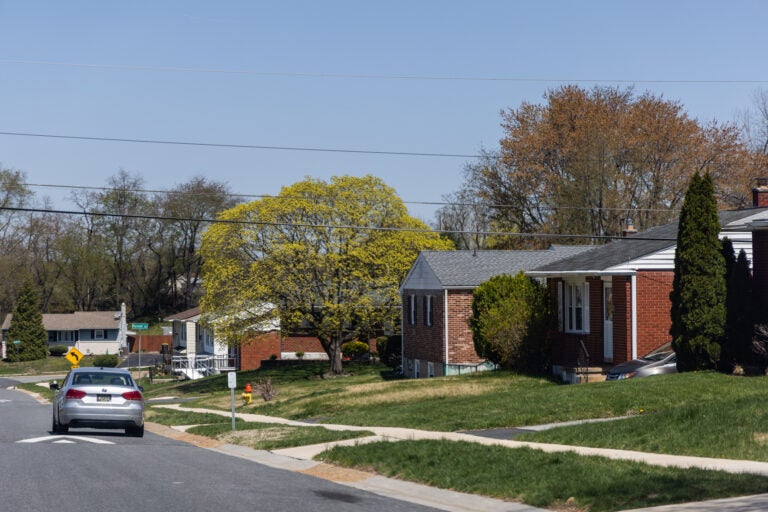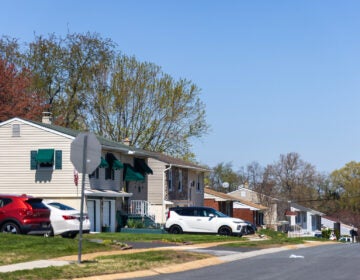Uncertainty looms over New Castle County property tax bills, pending outcome of lawsuit over rates
New Castle County landlords claim a new law allowing school districts to raise tax rates on commercial properties will cause them irreparable harm.
Listen 1:00
Homes in New Castle, Delaware (Kimberly Paynter/WHYY)
What are journalists missing from the state of Delaware? What would you most like WHYY News to cover? Let us know.
New Castle County property owners will be kept in limbo about the taxes they owe likely until the end of October.
That’s because a judge is weighing the merits of a lawsuit filed last month that challenges a new law that changed the formula for commercial and residential rates.
The lawsuit is the latest development in the turmoil swirling around the first reassessment of property values statewide in 40 years.
That process resulted in a dramatic shift in the tax burden from commercial properties to residential properties. It also prompted months of public outcry about skyrocketing tax bills and visible frustration from homeowners, pushing state lawmakers into an August special session to provide relief.
A bill sponsored by state Rep. Kim Williams, D-Stanton, allowed school districts to use split rates for residential and commercial properties. It was among a limited number of bills lawmakers passed and Gov. Matt Meyer promptly signed into law.
The September lawsuit was filed in Chancery Court from apartment landlords, hotel owners and manufactured home operators in Delaware’s largest county.
They have asked Vice Chancellor Lori Will for an accelerated ruling, arguing that the change in school property rates will cause them “irreparable harm.”

Will held a hearing Tuesday on the plaintiffs’ request for a temporary restraining order to prohibit the new split residential and commercial rates from taking effect. Will said in court she could likely hold a hearing on Oct. 20 to decide the case on an expedited basis, then issue a decision by Oct. 30.
The county had been planning to put new tax bills out in mid-October but agreed, along with the plaintiffs, to wait until the judge’s decision on how to proceed.
The county’s attorney, Nicholas Brannick, told Will that waiting until she rules would be better for property owners.
“There’s an extraordinary amount of confusion right now among taxpayers, whether they should pay the bills that are already out there, or whether they shouldn’t, whether they’re going to incur penalties if they don’t,” Brannick said. “We certainly don’t want to add to that. The situation is bad enough.”
Many homeowners saw their tax bills spike
Counties issue property tax bills that include school taxes, which constitute the majority of each owner’s tax burden. The tax bills issued after the reassessment went out in July.
Property owners in the state have paid artificially low rates because all three counties went decades without updating property values. New Castle County went 41 years without doing property reassessments.
A lawsuit brought in 2018 by civil rights groups argued that the lack of current property assessments contributed to inequities in how schools were funded. A Chancery Court judge agreed in 2020 that all property should be taxed equitably and at fair market value, and all three counties pledged to conduct reassessments.
While the reassessments went relatively smoothly in Kent and Sussex counties, contractor Tyler Technologies received immediate backlash from some New Castle County homeowners whose tax bills rose dramatically.
New Castle County’s then-chief financial officer, Jill Floore, told county officials in July that residents were seeing their share of the tax burden swell from 67% to about 76%. The city of Wilmington said earlier this year that residential properties are now 57% of its tax base while commercial properties make up just 29%. The city was not named in the lawsuit.
After months of controversy, the General Assembly passed about a half dozen bills during a special session aiming to calm the outcry. Williams’ legislation gave school districts the ability to levy split rates, similar to what the county and city of Wilmington did. A working group of legislators is holding hearings on the reassessment process starting Sept. 30.
Landlords, hotel owners, mobile home parks sue
Organizations suing include the Newark Property Association, Delaware Apartment Association, the Delaware Hotel & Lodging Association and the First State Manufactured Housing Association. They argue the new law shifts the tax burden away from wealthy and upper-middle-class homeowners directly onto renters with much lower incomes.
Apartment buildings with more than four units and the land leased to residents living in manufactured homes are considered “non-residential.”
Attorneys for the plaintiffs made it clear in Tuesday’s hearing that only the school tax rates were at issue in the case. It said school boards increased the non-residential rate as much as 80%.
The plaintiffs warn that if the split rates take effect, they will have to pass the costs onto their tenants or risk “financial ruin.”
Manufactured home residents Lorraine Burns and Evelyn Marshall said in the lawsuit that they live on fixed incomes and have multiple health conditions. They say a rise in their land rent of $20 or $45 a month could cause them to forgo needed medications and doctor visits.
The lawsuit contends that Williams’ legislation violates Delaware’s Uniformity Clause because it’s treating taxpayers differently based on their property type and because it’s a retroactive tax increase. It also argues that school districts are not allowed to raise additional revenue outside of a referendum, although state law allows them to realize a 10% increase after reassessments.
Williams said lawmakers passed stopgap measures intended to help homeowners until longer-term solutions could be considered in January.
“We were coming up with a short-term solution to take some of the burden off the residential property owners,” Williams said. “And that was the goal, and that’s why they developed this special working group just to try to get some answers on what has happened and how we got to where we’re at and what we can do moving forward.”
The county and school districts dispute that split rates are unconstitutional and said in court papers that the legislature’s decision to give school districts that ability was neither irrational or arbitrary.
They said the plaintiffs’ claim that the law shifts the tax burden directly onto renters is false and ignores the determination by lawmakers that commercial properties are better equipped to absorb tax increases than homeowners.
They also pushed back on the plaintiff’s argument that because the law was enacted after the county’s deadline to appeal the overall assessments, it violated their due process rights.
Brannick, the county’s attorney, told Will that a ruling by the end of October will still allow enough time for officials to send out new tax bills.
The county has already extended the payment deadline to Nov. 30.
This story was supported by a statehouse coverage grant from the Corporation for Public Broadcasting.

Get daily updates from WHYY News!
WHYY is your source for fact-based, in-depth journalism and information. As a nonprofit organization, we rely on financial support from readers like you. Please give today.










